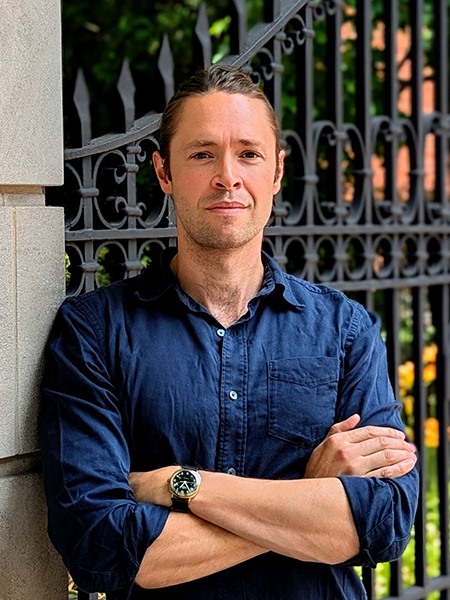Philosophy
Christopher Yeomans

Christopher Yeomans is Coordinator of CL@I and Head of the Department of Philosophy. He has done work funded by the National Science Foundation and Amazon on Fair AI. Inquiries regarding CL@I can be directed to him at cyeomans@purdue.edu or +1 765 494-4278.
Eamon Duede

Eamon Duede is an Assistant Professor of Philosophy at Purdue University and holds a joint appointment in the Data Science and Learning Division at Argonne National Laboratory. Eamon is an epistemologist of science focusing on three streams of research. His theoretical work in the philosophy of science focuses on the epistemology of emerging technologies, principally artificial intelligence (AI). His empirical work investigates and evaluates roles and capabilities of AI in enhancing the effectiveness and scalability of innovative, data-driven, and algorithm-assisted operational frameworks for scientific discovery. Prof. Duede is also concerned with the dynamics of discovery across disciplines, geographic space, and time. Here, he uses the computational techniques of ‘data science’ to study the flow of knowledge and influence between communities of experts and other audiences, and study how these can be catalyzed or stymied by institutional and technological factors.
Eamon’s research has appeared in leading venues such as Philosophy of Science, Synthese, Nature Human Behavior, Research Policy, and the proceedings of the Association for Computational Linguistics, among others. In 2022, he was named a Rising Star of Data Science by the University of Chicago’s Data Science Institute, and his research has been supported by grants from the Alfred P. Sloan Foundation, Google, Amazon, and others.
Before joining Purdue, Eamon was a Postdoctoral Fellow at Harvard University, affiliated with the Digital Data Design Institute at Harvard Business School and the Embedded EthiCS program in the Philosophy and Computer Science departments. Professor Duede earned a joint Ph.D. in Philosophy and Conceptual and Historical Studies of Science from the University of Chicago, where he was also an NSF-funded Fellow at the Pritzker School of Molecular Engineering.
Brett Karlan

Brett Karlan is an assistant professor in philosophy at Purdue University. He earned his PhD in philosophy from Princeton University and previously held postdoctoral positions in the McCoy Family Center for Ethics in Society at Stanford University and the Department of History and Philosophy of Science at the University of Pittsburgh.
Brett’s work is primarily focused on the intersection of the philosophy of science (especially cognitive science and artificial intelligence) and normative philosophy (especially epistemology, ethics, and the philosophy of action). His work has been published in the Australasian Journal of Philosophy, Synthese, Ratio, the Journal of Experimental and Theoretical Artificial Intelligence, and Neuropsychology. He has also been a researcher on two interdisciplinary grants funded by the Templeton World Charity Foundation, bringing philosophical reflection into direct contact with computer scientists, psychologists, engineers, and animal cognition researchers.
Javier Gomez-Lavin

Javier Gomez-Lavin is an assistant professor with the Department of Philosophy at Purdue University whose research lies at the intersection of cognitive science, moral psychology, and philosophy of mind and who serves as the incoming director of the new Purdue Normativity and Cognitions (PuNCs) lab (starting up summer 2023). Javier’s interdisciplinary work blends methods from experimental social psychology and analytical philosophy of science to help detail the multifaceted ways that cognition both shapes and is shaped by our social, aesthetic, and moral worlds.
Prior to coming to Purdue, Javier was a sessional assistant professor with the Department of Philosophy and Cognitive Science Program at York University in Toronto. From 2018 to 2021, Javier held a Provost Postdoctoral Fellowship at the University of Pennsylvania, where he worked with Professor Lisa Miracchi Titus and her MIRA lab group.
Javier earned his Ph.D. from the City University of New York in 2018 under the supervision of Professor Jesse Prinz. He was a co-PI on a grant funded by the Templeton Foundation and has been a guest researcher with the Berlin School of Mind and Brain at Humboldt-Universität zu Berlin since 2016.
Corey Maley

Corey Maley is an associate professor in the Department of Philosophy at Purdue University. His research concerns foundational questions about the nature of computation and its relation to artificial intelligence and cognitive science. Corey is interested in topics such as how analog computation relates to digital computation, whether natural systems (such as brains) can genuinely engage in computation, and what kinds of computations neural systems (both natural and artificial) can perform.
Before coming to Purdue, Corey was a faculty member of the Department of Philosophy at the University of Kansas. He earned his Ph.D. from Princeton University in the Logic and Philosophy of Science track. Corey also worked in a cognitive neuroscience lab at Washington University in St. Louis and earned a B.S. in computer science, mathematics, and psychology, and a B.A. in philosophy from the University of Nebraska–Lincoln.